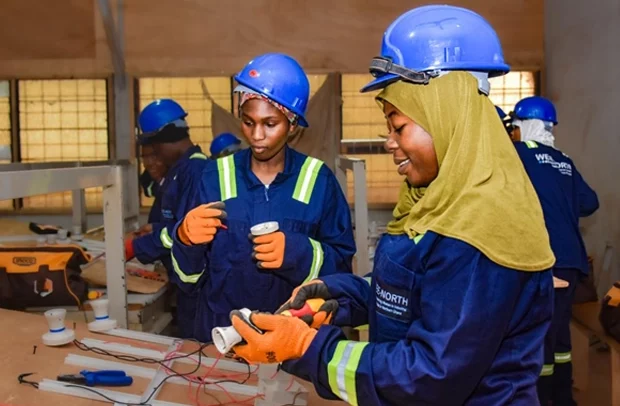Girls in TVET training
A comprehensive study conducted by UNICEF Ghana, in partnership with the government, has revealed a vast mismatch between the skills employers require and those that job seekers possess.
The study, which assessed the skills offered by public and private Technical and Vocational Education and Training (TVET) institutions and compared them with the skills demanded by the private sector, was commissioned in the Ashanti Region.
The key finding identified significant gaps in several areas, including curriculum misalignment where curricula often don’t align with industry demands.
For instance, the study found that in agriculture, a dominant sector in the Ashanti Region, the TVET system is woefully underserved.
“Only one of the 57 pre-tertiary TVET institutions offers training in agriculture, despite a high demand for agro-processing skills,” the study indicated.
Similarly, in ICT, despite rising demand, only four out of 57 institutions offer related training.
The study also identified perception gaps as one of the challenges, revealing that while employers cited weak practical and soft skills among graduates, the graduates themselves rated their preparedness more positively.
Again, infrastructure strain due to increase in enrollment factored by free TVET education, though laudable, it overwhelms infrastructure and undermines the effectiveness of Competency-Based Training (CBT), compromising the quality of delivery.
In the area of supply, fashion design and garment is the most offered trade, while green technology and advanced IT are the least. Infrastructure and equipment are inadequate and stretched to support growing enrollment. Soft skills training is largely absent from formal instruction. CBT accreditation in private institutions is higher than in public institutions.
On the demand side however, employers reported difficulty finding candidates with job-ready skills, practical experience, and soft skills. Workplace Experience Learning (WEL) is offered and supported but bears risks for employers.
It concluded that sectors like agriculture, ICT, and construction are in high demand with an insufficient skilled labour supply.
The study employed a mixed-methods approach, including institutional visits, employer surveys and interviews across key sectors (agriculture, ICT, manufacturing, and construction), and stakeholder consultations with educators, past students, and policymakers.
This comprehensive methodology allowed for a nuanced understanding of both the supply and demand sides of the skills ecosystem.
Ghana is among African countries projected to benefit from a demographic dividend, with a burgeoning youth population poised to drive economic growth.
However, this potential may not be realised due to high unemployment, persistent job insecurity, and limited job opportunities. TVET has emerged as a key pathway to equip young people with relevant skills for the labour market if harnessed strategically and aligned with industry needs.
While the study made several recommendations, a collective effort across the sectors and increased investment in TVET are required. Only then can Ghana fully leverage its demographic dividend for sustainable economic growth.
BY Dorothy Yeboah


